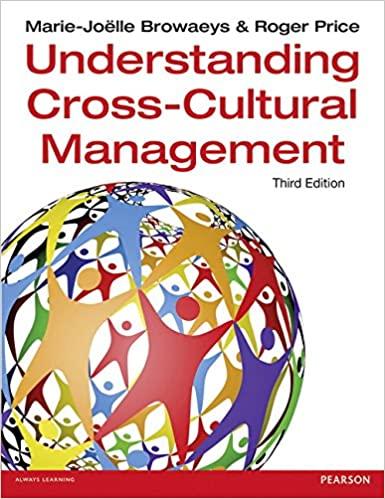Gordon Nixon makes a point of escaping Canadas frigid winter each January for a Caribbean cruise. But
Question:
Gordon Nixon makes a point of escaping Canada’s frigid winter each January for a Caribbean cruise.
But the excursion is more work than pleasure for Royal Bank of Canada’s chief executive. His 700 fellow passengers are RBC tellers, administrative staff , junior employees and middle managers who are being rewarded for superior performance. Mr Nixon joins the cruises to put into practice the teamwork and mutual respect he has tried to foster among RBC’s 73,000 employees in eight years at the helm of Canada’s biggest bank. As he sees it, that culture has played a crucial role in RBC’s ability – rivalled by only a handful of other large banks – to ride out the storms that have battered the financial services industry during the past two years. ‘We don’t tolerate fi efdoms and so forth’, Mr Nixon says. ‘Those are the sort of things that brought down a lot of organizations.’
Teamwork and ‘doing the right thing for the organization’ are non-negotiable elements of RBC’s culture, Mr Nixon says. ‘We can have the hottest-shot trader in the world, but if he doesn’t comply with the culture and values of the organization, we don’t want that person being part of the [bank].’
None of Canada’s big five banks – the others are Toronto-Dominion, Bank of Nova Scotia, Bank of Montreal and Canadian Imperial Bank of Commerce – has escaped the turmoil unscathed.
Even so, the Canadian banks are emerging from the crisis in better shape than most of their rivals elsewhere in the world. They have survived without any infusion of government money, and have relied far less on liquidity support than US and European lenders. All five have maintained their dividends.
Mr Nixon, 52, has a reputation as a level-headed manager. He joined Dominion Securities – at the time Canada’s biggest brokerage firm – 30 years ago and stayed on after RBC acquired it in 1987.
He has spent most of his career in investment banking, including a three-year stint in Tokyo.
RBC is gearing up to take advantage of its strong position. ‘I think we’ve got a period here that’s going to last at least two to five years where banks around the world are going to be shrinking their balance sheets when we have the ability to invest in all of our businesses’, he says.
Asked what RBC will look like five years from now, Mr Nixon is noncommittal. ‘In many ways that’s a dangerous question because it was at the root of some of the problems that some banks had in the early part of this decade’, he says.
‘There’s no hurry because there are going to be lots of opportunities and lots of restructuring in the financial services industry over the next five years. So if you do something, you want to make sure it’s very sensible and very strategic.’
On the capital markets side, however, Mr Nixon says: ‘We’re not going to make an acquisition.
We’re going to grow it by continuing to do what we’ve been doing for the past five years – which is to hire people, hire teams, extend our balance sheet, build our customer base.’ A great believer in having the right person running each business Gordon Nixon, Royal Bank of Canada chief executive, traces RBC’s good fortune to its conservative culture. In the late 1990s and early this decade, he says, there was a ‘pretty significant shift’. The bank wanted to make sure that ‘where we were extending our balance sheet, we were being paid for it’ and that in each case the client decision was sensible. ‘We weren’t going to lend our balance sheet to a customer in Europe who Royal Bank had no relationship with simply because there was an opportunity to lend money and to earn a return.’
Mr Nixon says he is ‘a great believer in ensuring that you’ve got the right person running your businesses and giving them the rope to make mistakes but also to do the right thing’. But, he adds:
‘You can’t be afraid to make changes even when you’ve got good people.’
The former chief operating officer is now head of strategy. She has been replaced by a thirteenstrong operating committee.
Questions
1. Define the corporate culture of RBC using the models presented in Chapter 7 .
2. To what extent does the behaviour of the RBC management reflect the Canadian business culture as outlined in Chapter 3 , where this is compared to that of the US?
Step by Step Answer:

Understanding Cross Cultural Management
ISBN: 9781292015897
3rd Edition
Authors: Marie Joelle Browaeys, Roger Price





